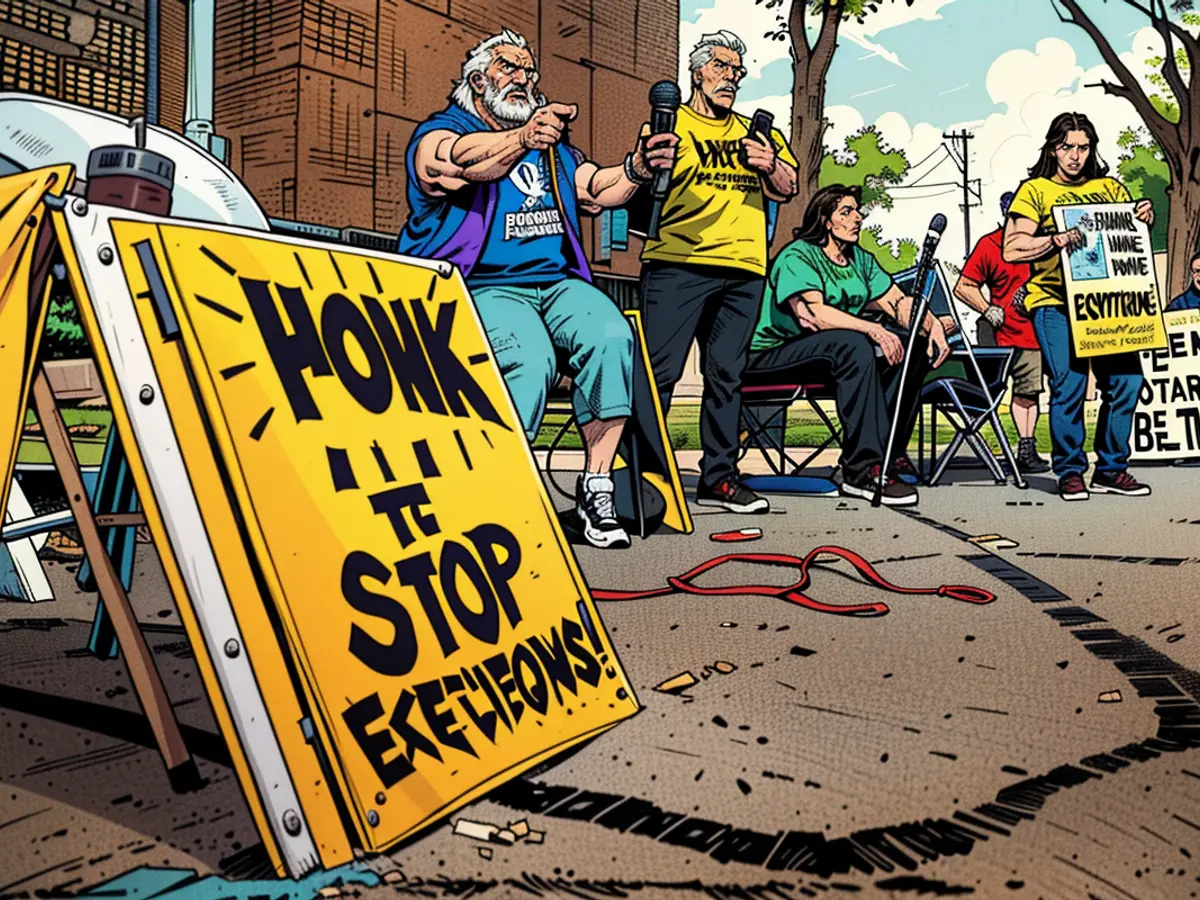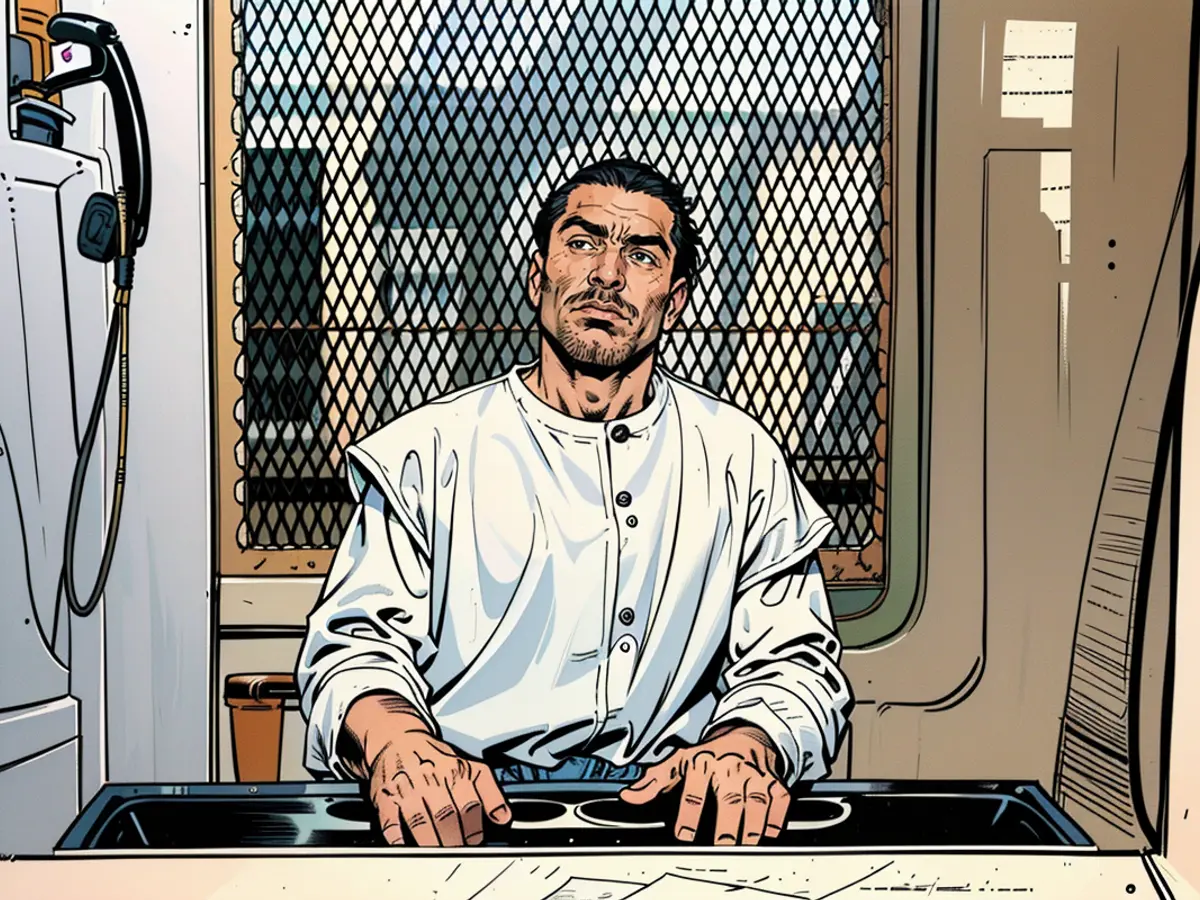The impending outcome of Robert Roberson, a death row inmate from Texas, testifying before a state legislative committee remains ambiguous.
The queries regarding his court appearance before legislators stem from recent days, following the House Committee on Criminal Jurisprudence issuing a warrant for Roberson to testify about his situation on the 24th of last week. This was an unusual move, occurring 24 hours before he was due to be executed for the 2002 "shaken baby" murder of his 2-year-old daughter, Nikki Curtis – a crime he and his supporters maintain did not occur. By the end of Thursday, after multiple legal battles and escalating appeals, the Texas Supreme Court issued a temporary halt on the execution.
This intervention came as a relief for Roberson, as other avenues to save his life were closing: His legal team had lost several appeals in Texas courts, the state Board of Pardons and Paroles had declined to recommend clemency, and the US Supreme Court had also refused to intervene.
On Monday, Roberson is scheduled to speak before legislators examining the lawfulness of his case – and whether changes should be made to a "junk science" law that his supporters believe could benefit him.
However, by Sunday evening, it was unclear if Roberson would show up at the hearing. His lawyer, Gretchen Sween, informed CNN that the Texas Attorney General’s Office and the Texas Department of Criminal Justice had yet to agree on the logistics of Roberson's testimony.
The committee's warrant necessitates Roberson's in-person appearance, according to Sween, and lawmakers expect him to be present at the Capitol.
Sween wishes to have Roberson testify in person so that lawmakers and the public can fully appreciate how his autism affects his interactions with people, which his supporters argue was a factor in his conviction.
In contrast, Texas prison officials will allow Roberson to testify virtually, the attorney general's office stated in a letter to committee chairman Joe Moody on Friday night, citing criminal justice department policies, public safety concerns, and Roberson's well-being.
“We are bound. The AG is representing TDCJ and is dictating the terms, while simultaneously challenging the subpoena before the Texas Supreme Court. We anticipated that the subpoena would be honored according to Texas law and the committee’s intent. But there was a switcheroo here,” Sween said in a statement to CNN.
Texas prison officials did not directly respond to whether Roberson would travel to Austin for the hearing or testify virtually, stating they were collaborating with the attorney general's office.
The attorney general's office has not responded to repeated requests for comment since the warrant for Roberson was issued.
The hearing remains scheduled and is expected to include other witnesses.
According to Texas law, a judge must schedule a new execution date at least 90 days in the future. Sween previously told CNN that the earliest a new execution could be set would be next year.
The next steps remain uncertain. Here's what we know:
The case
Roberson was accused of capital murder in a trial that relied on claims that his daughter died from "shaken baby syndrome" – a misdiagnosis, his lawyers argue, one that has since been discredited. Child abuse pediatricians and medical organizations like the American Academy of Pediatrics continue to uphold the legitimacy of the diagnosis.
But Roberson, his lawyers, and supporters propose various other potential causes for Nikki's death, citing their medical experts: She had double pneumonia that had progressed to sepsis, they say, and she had been prescribed two medications considered inappropriate for children that would have further impaired her breathing ability. Additionally, the night before Roberson took her to a Palestine, Texas, emergency room, she had fallen off a bed, and was particularly vulnerable given her illness, Roberson's lawyers claim. They point to all these factors as explanations for her condition.
Roberson brought Nikki to the hospital on the morning of January 31, 2002. He informed investigators that he had awoken in the night to find her fallen off the bed, with some blood on her lips and a bruise under her chin, according to the criminal complaint. He kept her awake for two hours to ensure she was okay, he stated, but when he woke that morning, she was unresponsive.
Doctors treating Nikki presumed abuse based on her symptoms and common thinking prevalent at the time of her death without considering her recent medical history, the inmate’s attorneys claim. They allege that his behavior at the emergency room – viewed as uncaring by doctors, nurses, and police, who believed it a sign of his guilt – was a consequence of his autism spectrum disorder, undiagnosed until 2018.
Indeed, police never investigated alternative reasons for Nikki’s death other than shaken baby syndrome, according to Brian Wharton, the former lead detective of the Palestine police. The guidance of medical experts combined with Roberson’s demeanor led authorities to consider him as a suspect "to the exclusion of any other possibilities," he has told CNN.
Aggressive head trauma usually happens when an agitated guardian or caretaker violently shakes a youngster or inflictions a blunt injury, as per the US Centers for Disease Control and Prevention and other sources. It's the main reason for child abuse fatalities in kids under 5 years old, according to the CDC.
Defense attorneys have made simple diagnoses of aggressive head trauma seem less complex to doctors who specialize in child abuse, these specialists say, considering numerous factors to establish it.
Nevertheless, courts nationwide have been revisiting the impact of shaking baby syndrome in judgments that rely on it: Since 1992, courts in at least 17 states and the US Army have exonerated 32 people who were convicted based on shaking baby syndrome, according to the National Registry of Exonerations.
Those who doubt the diagnosis point to research they claim weakens its reliability. However, within the legal context, they are also concerned that the diagnosis seems to cover multiple aspects of a crime, such as the accused, their mental state, and the crime's method.
“It’s the entire case, and that is Mr. Roberson’s case,” Keith Findley, emeritus professor at the University of Wisconsin Law School, told the Texas Committee on Criminal Jurisprudence last week. “When your conviction rests entirely on medical, scientific opinion, and that opinion turns out to be, at best, deeply disputed, you have a recipe for real problems.”
Child abuse specialists, however, staunchly defend the diagnosis.
“I don’t know what to say about the legal controversy,” Dr. Antoinette Laskey, chair of the American Academy of Pediatrics’ Council on Child Abuse and Neglect, told CNN. “This is real, it impacts children, it affects families.”
Testimony
Roberson's potential testimony on Monday is scheduled before the House Committee on Criminal Jurisprudence, which includes legislators who have backed Roberson's case. Their subpoena calls for Roberson to "provide all testimony and information concerning the committee’s inquiry."
Last Wednesday, the same committee held a hearing about Roberson's case, and whether he should have benefited from a Texas law commonly referred to as the “junk science writ.” The law, formally known as Article 11.073, dates to 2013, and was intended to allow someone to challenge their conviction if there is new scientific evidence that was not available during their trial.
Roberson's supporters believe he should have benefited from this law. The Texas Court of Criminal Appeals issued a stay of execution in Roberson's case in 2016, sending a claim under Article 11.073 (among others) back to the trial court. The lower court ultimately ruled against Roberson, finding that he had not shown there was new scientific evidence relevant to his case, and the appeals court later accepted these findings.
“I believe that section 11.073 simply did not work as it should have in the Robert Roberson case,” Findley testified last Wednesday – a sentiment echoed by members of the House committee, who signaled last week's hearing was as much about Roberson as it was about finding a way to fix a law they felt had not functioned as intended.
“Every member of this committee has been surprised by how it has been applied in this particular case,” Moody, the committee chair, said of Article 11.073. “Quite frankly, we’ve reviewed this case in detail, expected that this law would provide relief, and that has not happened.”
“When the legislature passes a law and finds out that it’s not working the way that it was intended to, it is incumbent upon us to step in and make that law right.”
- Regarding the upcoming hearing, Sween expressed concern that if Roberson testifies virtually, the committee and the public might not fully understand how his autism affects his interactions, as she hopes an in-person appearance would allow for a more comprehensive understanding of this aspect.
- Despite the Texas Attorney General's Office stating that they would allow Roberson to testify virtually due to criminal justice department policies, public safety concerns, and Roberson's well-being, Sween and her team believe this goes against the committee's intent and the warrant issued for Roberson's in-person appearance.









